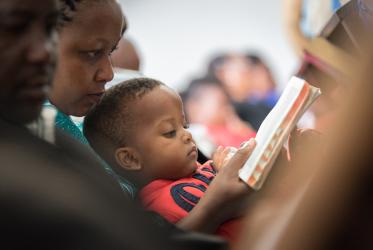The Lent resource helps communities respond to modern slavery, which affects around 50 million people globally. According to Anti-Slavery International, the number of children in modern slavery is over 12 million, with an increase of 2 million in 2022. Climate-induced disasters such as flooding and droughts raise children’s vulnerability to trafficking and other forms of modern slavery.
"This resource is an important contribution from the WCC in partnership with The Clewer Initiative in addressing the challenge of modern slavery,” stresses Rev. Dr Kenneth Mtata, WCC programme director for Public Witness and Diakonia, who was involved in the conceptualisation of the resource.
Structured around Galatians, the resource offers weekly explorations with Bible reflections, discussion questions, modern slavery facts, global case studies, and actionable points that can be tailored to national and regional contexts worldwide.
Bishop Alastair Redfern, chair of The Clewer Initiative, explains: “Modern slavery is an example of a crime which requires a united but also contextualised response. Because modern slavery and exploitation is present in every community across our globe, the Church has a huge opportunity and responsibility to be on the frontline, identifying and protecting vulnerable people who are at risk of exploitation and caring for victims. The Clewer Initiative has been developing resources for the Church of England, the Anglican Communion and partner churches for a number of years. It is an enormous privilege to collaborate with the World Council of Churches and make this act of witness together.”
The idea for this project came up in January 2023 during a conversation between WCC general secretary Rev. Prof. Dr Jerry Pillay and Bishop Alastair Redfern. It expands on the partnership between WCC and TCI, which started in 2020 as part of Churches' Commitments to Children. The project is inspired by successful pilot runs in Ghana, Tanzania, and Italy in collaboration with the national councils of churches.
“The resource deepens awareness of the responsibilities of Christians to address the root causes of the injustices and vulnerabilities which push people into modern slavery. For churches, congregations, and individuals, it is important to understand how the prevalence of modern slavery is also increasing as a result of global warming,” said Frederique Seidel, WCC programme executive for Child Rights, directly involved in facilitating the work on the resource.
A webinar is planned for January 2023 to support the dissemination of the resource by churches to their congregations and partners.







